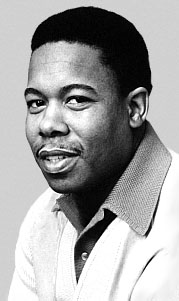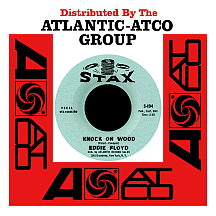EDDIE FLOYD
Knock on Wood
When it comes to composing pop songs, the process can sometimes involve the use of an everyday catch phrase that (fingers crossed!) listeners will find irresistible. Like when Eddie Floyd got to thinking about habits borne of superstition; "knock on wood" seemed like a good one, so he ran the idea past Steve Cropper, who suggested lyrics and worked on the melody. The song began to take shape, though neither was aware of the already-existing "Knock on Wood," written specifically for Casablanca by Warner Bros. staff composer M.K. Jerome and lyricist Jack Scholl in 1942, resulting in a memorable onscreen performance by Dooley Wilson. At least it was memorable to anyone who'd seen the famous film, which suprisingly didn't include Eddie or Steve.
Floyd's family had moved to Detroit shortly after his birth in Montgomery, Alabama in 1937 (regardless, he spent a large chunk of his childhood living with relatives in Montgomery). By the time he was hired by Jim Stewart of Memphis, Tennessee's Stax Records, he'd spent several years as the lead singer of The Falcons, a '50s R&B quintet that scored a hit, "You're So Fine," on Unart in 1959 (though it was Joe Stubbs who sang lead on the track). Eddie was still a member the group in 1962 when they had a second top ten R&B hit, "I Found a Love" on Lu Pine, a showcase for newer member Wilson Pickett's decibel-elevating vocal style and a deciding factor in the Wicked One's pursuit of a solo career. Eddie quit in '63 and moved to Washington, D.C., where he ran into Chester Simmons of rival late-'50s Motor City group The Moonglows. Two singles, composed by Eddie and produced by the pair, were issued on Lu Pine; "Will I Be the One" and "I'll Be Home," subpar productions of heartfelt ballads, did little more than throw Floyd's future into doubt.
23-year-old Arkansan Al Bell (birth name Alvertis Isbell) had been working as a disc jockey for a few years, going from Little Rock to a small station in Georgia and then to Memphis, where he made a big splash around 1961; by '64 he was working at WUST in D.C., one of the nation's top markets. He and Simmons produced a few Floyd sides for Safice, a small label distributed by Atlantic; "Never Get Enough of Your Love," a much-improved effort in a league with Pickett's or Solomon Burke's early work, received the required production boost...it was recorded at the Stax studio in Memphis. Based on the strength of this and one other Safice disc, Atlantic released Floyd original "Hush Hush" on the parent label, but lack of airplay limited him to just the one single.
He wound up at Stax in the summer of 1965 after Al gained a position there as a promotion man (a very good one, it turned out) and helped get him in the front door of the company's McLemore Avenue set-up in a vacated movie theater. As ready as Eddie was to make his own records, Stewart was more interested in his songwriting skills and signed him to a limited contract with the company's publishing arm, East Music. By the end of the year Floyd and Bell provided two artists, Carla Thomas ("Stop! Look What You're Doing") and Burke ("Someone is Watching You") with minor chart hits. Then, working with Booker T. and the MG's guitarist and A&R/production whiz Steve Cropper, Eddie wrote two important songs for recent Atlantic label signee Wilson Pickett: "634-5789 (Soulsville, U.S.A.)," which spent an impressive seven weeks at number one on Billboard's R&B charts, and "Ninety-Nine and a Half (Won't Do)." Eddie had played his cards right...it was time to wax his first smash for Stax as a vocalist, with Stewart's approval. "Things Get Better (When I'm With You)," lifted from Coca-Cola's "Things Go Better With..." ads, wasn't it.

Then his ship came in: "Knock on Wood" ('...it's like thunder...lightnin'...the way you love me is frightenin'...'), with its boss Memphis horn section and MG's rhythmkeeper Al Jackson supplying the four banging-door drumbeats netween 'knock...' and '...wood,' landed at number one R&B in November 1966 and went top 30 pop. Eddie had successfully transitioned from a second- or third-string group member to solo hitmaker and productive songwriter...taking a common slang term and turning it into a soul classic! On the other hand, keeping the momentum going was tricky...but Eddie couldn't complain. Over the next year or so he infiltrated record surveys with several soulful tracks: "Raise Your Hand," "Don't Rock the Boat," "Love is a Doggone Good Thing" and "On a Saturday Night," all penned with input from Cropper and other Stax-men, while providing (also with the usual songwriting collaborators) charting singles for Thomas, Otis Redding, Sam and Dave and Oscar Toney, Jr. (who recorded across town at former Stax employee "Chips" Moman's American Sound Studio). In the spring of '68, Redding and Thomas (as Otis and Carla) did their own take on "Knock on Wood." It was almost as big as the slightly-over-a-year-old original...and it wasn't the last time the song would make an impact.
Stax and Atlantic parted ways in 1968 and the label (Gulf and Western bought them out shortly afterwards) sported a new "finger-snapping" logo on a yellow background. Floyd stayed with Stax and had two major hits during this late-'60s period. His summer '68 smash featured sweet-sounding strings arranged by Booker T., a departure from anything coming out of Stax's theater-turned-studio; "I've Never Found a Girl (To Love Me Like You Do)" hit the pop top 40 and went as high as number two R&B. "Bring it on Home to Me," the Sam Cooke smash from '62, was quite the rarity: a song Eddie didn't write! The autumn release (lucky charm? It was his seventh to make the Hot 100) reached the top 20, the highest-ranked of all his pop chart singles.
Floyd enjoyed several more years as a successful act, although outside the mainstream top 40. No less than ten singles made respectable appearances on pop and rhythm and blues charts between 1969 and 1974, some of them with gimmicky catch-phrase titles ("Why is the Wine Sweeter (On the Other Side)," "Blood is Thicker Than Water") indicative of the song that made him famous. He'd found his comfort zone as a songwriter, as he bounced ideas off his working buddies Bell, every member of the MG's and, later, longtime friend and fellow Falcon Mack Rice. But good times don't last forever; Stax filed for bankrupcy and closed its doors in 1975. Eddie was there until the end.
In 1976 and '77 he produced his own material for the Jackson, Mississippi-based Malaco label and even recorded a duet ("We Should Really Be In Love") with the company's most successful artist, Dorothy Moore. In 1979 he scored his biggest coup as a composer when D.C. disco singer Amii Stewart's revival of "Knock on Wood" became a chart-topping, platinum-selling monster. Eddie Floyd has since toured on Stax-Volt Revue shows with Carla Thomas, Booker T. and the MG's and others and had a welcome comeback after connecting with Dan Aykroyd, performing "634-5789" with Wilson Pickett and modern-day blues singer Jonny Lang in the 1998 film Blues Brothers 2000.


